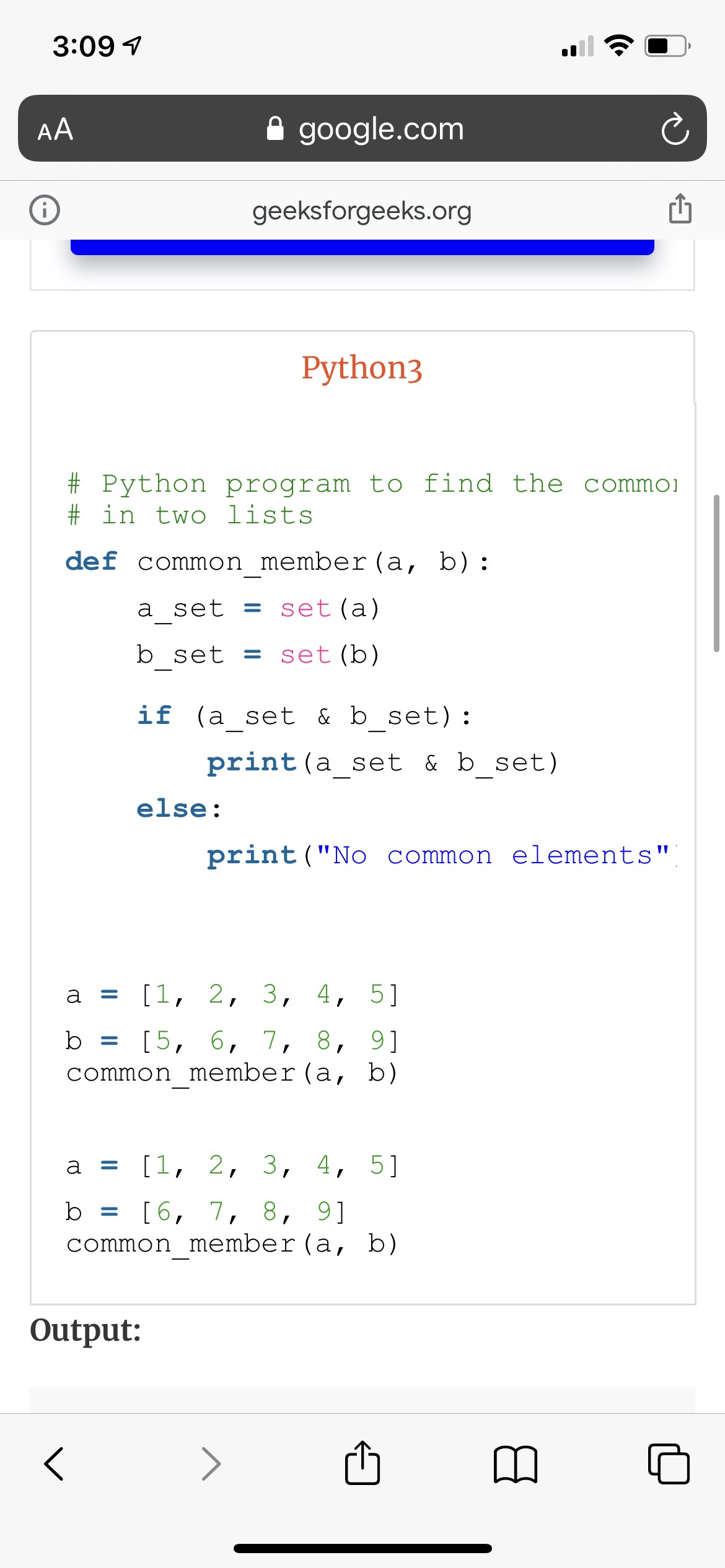Is there a function that returns common elements in multiple lists
53 views
Skip to first unread message
bnmng
Jan 25, 2022, 7:46:58 AM1/25/22
to Django users
Hello,
def in_both( list_a, list_b ):
Or this:
def in_all(list_of_lists):
list_a = list_of_lists.pop(0)
list_b = []
for value in list_a:
in_all_lists = True
for each_list in list_of_lists:
if not value in each_list:
in_all_lists = False
if in_all_lists:
list_b.append(value)
return list_b
Is there a built in function that compares two or more lists and returns elements common to all?
like this:
def in_both( list_a, list_b ):
list_c=[]
for value in list_a:
for value in list_a:
if value in list_b:
list_c.append(value)
return list_c
Or this:
def in_all(list_of_lists):
list_a = list_of_lists.pop(0)
list_b = []
for value in list_a:
in_all_lists = True
for each_list in list_of_lists:
if not value in each_list:
in_all_lists = False
if in_all_lists:
list_b.append(value)
return list_b
Thank you
Kasper Laudrup
Jan 25, 2022, 2:10:48 PM1/25/22
to django...@googlegroups.com
On 25/01/2022 13.46, bnmng wrote:
> Hello,
>
> Is there a built in function that compares two or more lists and returns
> elements common to all?
>
The intersect member function almost does that, just combine in with
> Hello,
>
> Is there a built in function that compares two or more lists and returns
> elements common to all?
>
converting your list to a set:
https://datagy.io/python-intersection-between-lists/
BTW it is better to ask questions like these on mailing lists dedicated
to Python programming in general.
Kind regards,
Kasper Laudrup
bnmng
Jan 25, 2022, 3:07:04 PM1/25/22
to Django users
Thank you. That set.intersection with list conversion seems like the way to go. On your second point, well taken. I'll keep that in mind for future Python questions
Sam Chaffy
Jan 25, 2022, 3:08:59 PM1/25/22
to django...@googlegroups.com
You can use sets
--
You received this message because you are subscribed to the Google Groups "Django users" group.
To unsubscribe from this group and stop receiving emails from it, send an email to django-users...@googlegroups.com.
To view this discussion on the web visit https://groups.google.com/d/msgid/django-users/bf2cf505-6205-4fcf-affd-9a0a2f7e5e00n%40googlegroups.com.
Oussama Chafiqui
Sam Chaffy
Jan 25, 2022, 3:11:10 PM1/25/22
to django...@googlegroups.com

--
You received this message because you are subscribed to the Google Groups "Django users" group.
To unsubscribe from this group and stop receiving emails from it, send an email to django-users...@googlegroups.com.
To view this discussion on the web visit https://groups.google.com/d/msgid/django-users/4465553d-8aa1-4ab2-9e9c-19c4117d623fn%40googlegroups.com.
Oussama Chafiqui
bnmng
Jan 26, 2022, 6:06:11 AM1/26/22
to Django users
Thank you. I think I'll go with sets as advised, although this method also looks very neat:
intersection = [item for item in list1 if item in list2] found at https://datagy.io/python-intersection-between-lists/
intersection = [item for item in list1 if item in list2] found at https://datagy.io/python-intersection-between-lists/
Muhammad Shehzad
Jan 26, 2022, 7:48:02 AM1/26/22
to django...@googlegroups.com
Use intersection
To view this discussion on the web visit https://groups.google.com/d/msgid/django-users/fc7b49a3-2ca2-48e1-8556-f742e16fa4c9n%40googlegroups.com.
Muhammad Shehzad
Jan 26, 2022, 7:52:05 AM1/26/22
to django...@googlegroups.com
a = [1,2,3,4]
b = [3,4,5,6]
Convert list a to set
a_set = set(a)
print(a_set.intersection(b))
Nick Farrell
Jan 26, 2022, 5:28:06 PM1/26/22
to Django users
>>> a = {1, 2, 3}
>>> b = {2, 3, 4}
>>> a & b
{2, 3}
>>> b = {2, 3, 4}
>>> a & b
{2, 3}
Reply all
Reply to author
Forward
0 new messages
